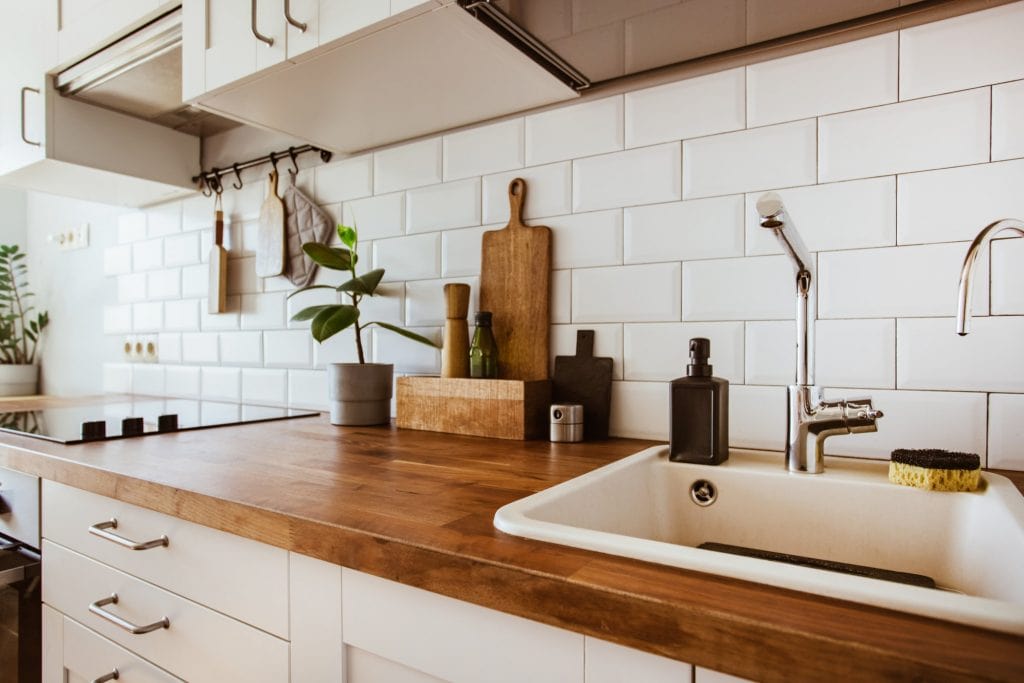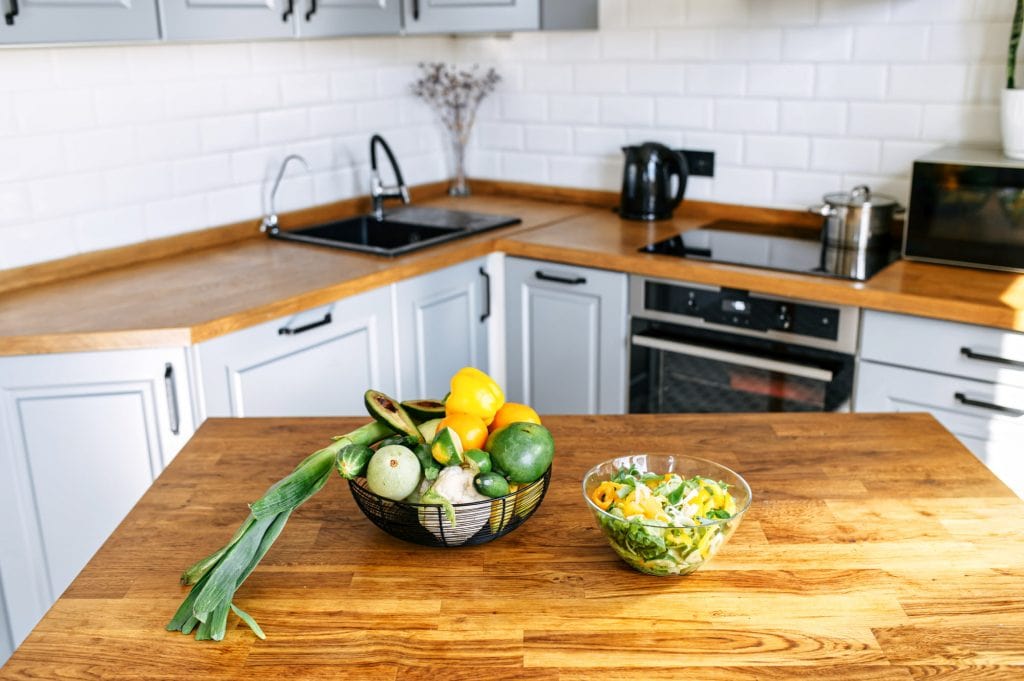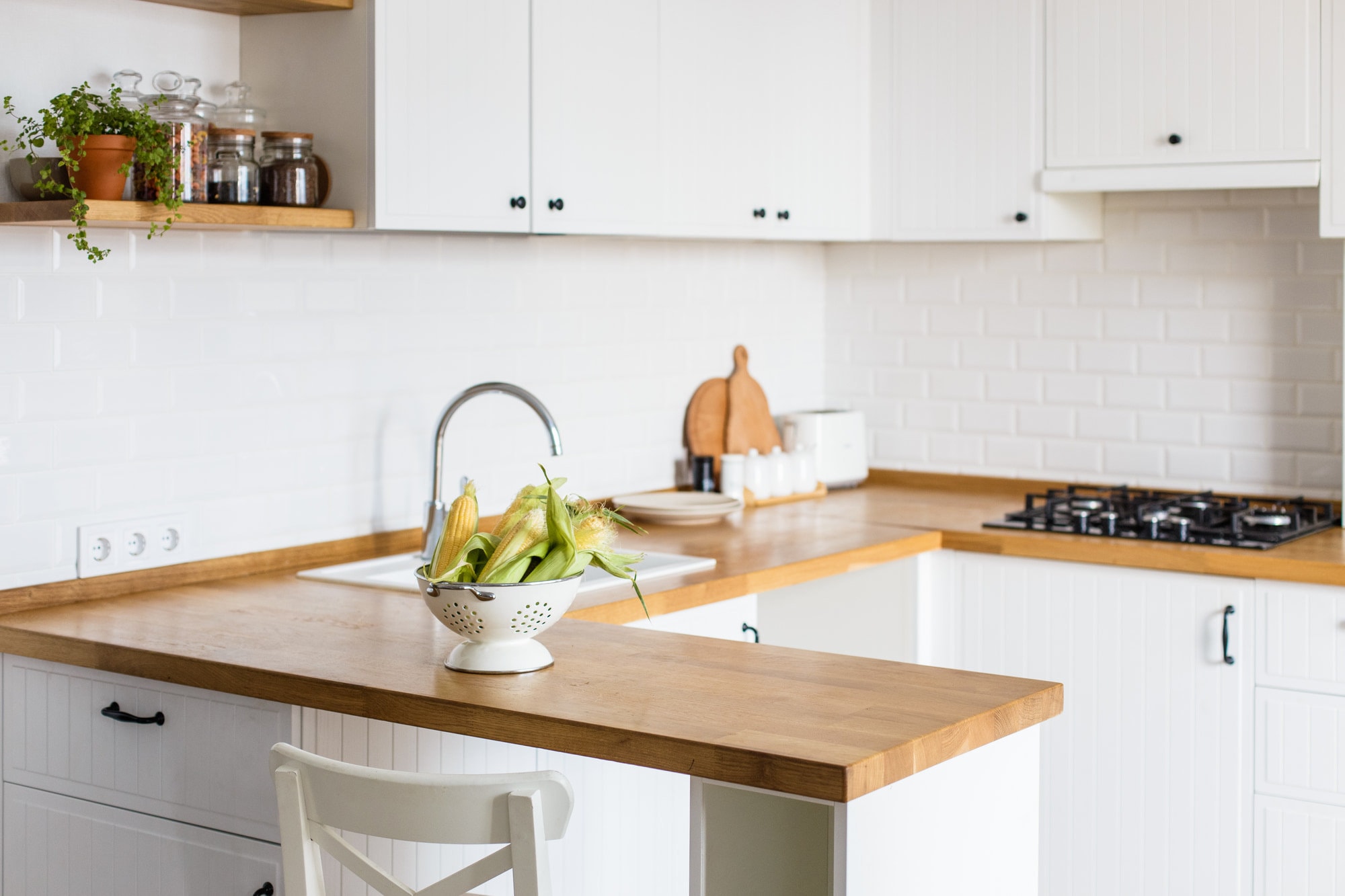Among the various countertop options available today, butcher block counters are growing increasingly popular due to their rustic charm, many color options, and the natural appeal of solid wood.
However, before deciding to install a butcher block countertop, it’s essential to consider if this choice can boost your home value. In this guide, we will help you understand the impact of butcher block countertops on home value and how they differ from other options.
Factors That Influence Home Value
Several factors influence a home’s value, from the location and size of the property to interior design and maintenance. Among these factors, the kitchen’s condition plays a pivotal role.
The kitchen often serves as the heart of the home, a hub for family meals, and a space for entertaining. Thus, the aesthetic appeal of a kitchen can set the tone for the entire house. The color scheme, quality of fixtures, type of flooring, and even the choice of backsplash can either invite admiration or dissuade interest.
Additionally, a functional kitchen further increases a home’s value. It must have an efficient layout that maximizes storage, provides ample countertop space, and accommodates modern appliances.
However, it’s important to remember that trends in real estate can fluctuate. What’s considered stylish and desirable today may appeal differently in a few years. Open-concept kitchens might be all the rage in one decade, while in another, the charm might lean towards cozier, partitioned spaces.
Among a kitchen’s many features, countertops hold a place of prominence. They occupy a large visual space and are the primary work surface. A countertop’s material, finish, and maintenance needs can sway a potential buyer’s decision immensely.
For example, marble may scream luxury but requires more care than other materials. On the other hand, butcher block countertops, being both aesthetic and functional, offer a warm, organic touch that many contemporary homeowners appreciate.
Understanding Butcher Block Countertops
Butcher block countertops, also known as solid-wood, finger-joint countertops, or hardwood countertops, are crafted from cuts of wood glued together under high pressure. The resulting block reveals the wood’s natural grain, providing a visually stunning and practical work surface.

As homeowners become more environmentally conscious and lean towards natural aesthetics, butcher block countertops have found their way into many kitchens worldwide. The name originates from their initial use in butcheries, where the robust, durable surface was ideal for chopping and cutting.
A wide range of woods is used in these countertops, from affordable species like ash and birch to more premium options like maple, oak, and walnut.
The choice of wood significantly impacts the countertop’s aesthetic appeal, durability, and maintenance requirements. For instance, maple is popular due to its dense grain character and light color range. On the other hand, walnut, known for its distinct color variations and beautiful curved grain pattern, adds an exotic touch to any kitchen decor.
Advantages of Butcher Block
There are several advantages to using butcher block in your kitchen, and many of these advantages increase the value of your home. Here are just a few of the benefits of butcher block countertops:
- It adds a cozy charm: Unlike stone or stainless steel countertops, wood provides a welcoming and inviting space, giving a more homely vibe.
- Each countertop is one-of-a-kind: Their organic grain patterns, knots, and color variations make each butcher block countertop unique. This natural artistry of each custom countertop can serve as a captivating focal point in a kitchen, increasing its value.
- They are incredibly durable: With proper care and maintenance, they can withstand daily kitchen activities and last for years. Even when they begin to show wear, they can often be refinished to look brand new. They are also kinder to sharp blades than harder surfaces, making them an excellent choice for avid home chefs.
- It’s Eco-Friendly: Since many butcher block countertops are crafted from reclaimed or sustainably sourced wood, they are a top choice for those keen on conserving natural resources.
- It keeps the kitchen peaceful: Wood’s natural sound absorption property contributes to a quieter kitchen ambiance, unlike stone or steel surfaces.
Concerns
While there are plenty of advantages to having butcher block countertops in your kitchen, it’s crucial to be aware of any challenges that butcher block presents. Here are some things to consider:
- Butcher block requires maintenance: Some homeowners are concerned about butcher block countertops’ maintenance. They require regular sealing with food-safe oil to prevent drying and cracking.
- Accident prone: Butcher block can be prone to scratches and water damage if not correctly cared for. However, these can often easily be sanded out and the countertop resealed to look new.
- It’s susceptible to water damage: Since wood is prone to water damage, it’s crucial to wipe up spills promptly and ensure that the countertop is adequately sealed, especially around sinks. Avoid prolonged exposure to water to ensure the countertop’s longevity.
Comparing Butcher Block Countertops to Other Options

While butcher block counters have gotten considerable attention recently, it’s essential to understand how they compare to other popular countertop materials like granite, quartz, and laminate. Each offers unique advantages and disadvantages, and their costs can vary significantly.
Granite
We start with granite. A popular choice for many homeowners, this ever-durable material is a go-to choice for many homeowners due to its luxurious appearance and resilience. Its natural color variations and patterns are beautiful and warmer than wood countertops.
However, granite countertops can be expensive, with prices typically exceeding those of butcher block countertops.
Quartz
Next, quartz countertops are another popular option, known for their durability and non-porous nature, making them resistant to stains and bacterial growth. Quartz is more expensive than a butcher block, though not as pricey as granite.
Since quartz is a manufactured stone, it offers a consistency that other materials don’t. Although they have different colors and patterns, these countertops can’t match the organic warmth and natural charm of butcher block.
Laminate
Laminate countertops are among the most affordable options, often cheaper than butcher blocks. These countertops come in vast colors and patterns, mimicking the look of more expensive materials like granite or quartz.
However, the lifespan and durability of laminate countertops don’t match up to butcher block ones. Scratches and burn marks on them are generally permanent, whereas you can sand and reseal a butcher block countertop to remove similar damage.
Butcher block countertops can offer a good ROI, especially if the kitchen’s design highlights natural, warm aesthetics. Their timeless appeal and the trend toward eco-friendly materials can enhance resale value. Their ability to be refinished is also a selling point.
Key Takeaways
Kitchen renovations, including the selection of countertops, significantly impact a home’s value, functionality, and overall appeal. Butcher block stands out for its organic warmth and unique visual appeal among all kitchen countertops. But does it increase home value?
Butcher block countertops can potentially increase home value, especially when they align with contemporary eco-friendly and natural design trends. While they may not offer the immediate ROI of materials like granite or quartz, their unique aesthetic appeal, and functionality make a home more appealing to potential buyers.
The decision to install butcher block countertops should not be based solely on their potential to increase home value. It’s equally important to consider personal preferences, budget constraints, and market trends.
For example, the rustic charm and warmth of the butcher block might be perfect for those seeking a cozy, welcoming kitchen ambiance. Others might prioritize low-maintenance, sleek materials like quartz or granite.
Remember, the goal is to create a space that meets your functional needs, aligns with your aesthetic preferences, and optimizes your investment.
If you’re looking for a new home featuring butcher block countertops, search property listings to find something you like. However, if you want a professional opinion, contact a local eXp agent. With their expert guidance, you can navigate your options and make the best choices.
FAQs
Here are some common questions about butcher block counters to help you further!
Is butcher block cheaper than granite?
Typically, butcher block countertops are less expensive than granite, but prices can vary depending on the type of wood and finish chosen.
Do butcher block countertops last long?
With proper care and maintenance, butcher block countertops can last for decades. It’s crucial to seal them regularly to prevent water damage and stains.
Are butcher block countertops low maintenance?
While they require some maintenance, such as regular sealing and cleaning, butcher block countertops can be quite easy to maintain. Any scratches or minor damage can often be sanded out and resealed.
Are butcher block countertops cheaper than quartz?
Generally, butcher block countertops are less expensive than quartz, but costs can vary based on the wood type and professional installation.
Will butcher block countertops increase home value?
While they might not increase home value as significantly as more high-end materials like granite or quartz, butcher block countertops add unique warmth and character to the kitchen, expanding the home’s overall appeal to potential buyers.
Can you put hot pans on butcher block?
Placing hot pans directly on a butcher block countertop is generally not recommended as it can cause burn marks. However, such damage can often be sanded and resealed.
Can butcher block countertops get wet?
Butcher block countertops can handle occasional water exposure but should be wiped dry immediately to prevent water damage and stains. Regular sealing can help protect the wood further.
Can you cut directly on butcher block?
Yes, one of the pros of butcher block countertops is that you can directly cut on them. However, this will eventually leave cut marks, which can be sanded out if desired.





